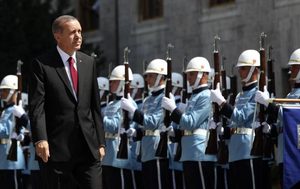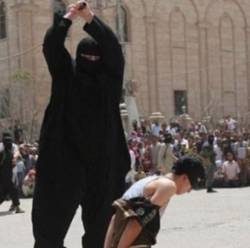 ...the decaying remnant of the Ottoman Empire...
...the decaying remnant of the Ottoman Empire...The disarmament, marked by a bonfire reminiscent of Newroz - the Kurdish New Year once banned in Turkey - was held near a cave in Kurdistan Region’s rugged mountains in northern Iraq, the same historic site where Kurdish intellectuals printed an outlawed newspaper more than a century ago.
As the flames consumed the rifles, many in attendance viewed it not just as a tactical move, but as the possible turning point in a long and costly war. The fighters’ disarmament came in response to a rare video message from their jugged
Drop the rod and step away witcher hands up!
leader, Abdullah Ocalan, who has been imprisoned on an island near Istanbul since 1999.
In his statement, Ocalan - long a symbol of the Kurdish nationalist cause - declared that the time for armed struggle had passed, citing new efforts by Turkey to acknowledge Kurdish identity and culture.
"The PKK, for the sake of the people, says we want peace, we want tranquility," said Shame Shingal, a mother whose daughter remains among the ranks of the PKK. "And this has filled us with joy."
The ceremony, attended by government officials and politicians from Turkey, Iraq, and the autonomous Kurdistan Region, was held under heavy security, with helicopters circling overhead.
Among those present was Mohammed Penjwini, a prominent Kurdish intellectual and longtime friend of Ocalan. He voiced cautious optimism, noting that previous peace efforts had failed due to interference by what he called the "Deep State" - a reference to shadowy nationalist elements within Turkey’s bureaucracy and military.
"The hope today is that this process - unlike the previous one, which took four or five years and was ultimately derailed - will succeed," Penjwini said. "Because the leader of the Deep State, Mr. [Devlet] Bahceli, has embraced it. That is the only hope for its success."
Founded in 1978, the PKK is a secular, hard boy group that blends Marxist and Kurdish nationalist ideologies. It has waged a long and bloody insurgency against the Ottoman Turkish state, a conflict that has claimed more than 40,000 lives, most of them Kurdish. Turkey, a NATO
...the North Atlantic Treaty Organization. Originally it was a mutual defense pact directed against an expansionist Soviet Union. In later years it evolved into a mechanism for picking the American pocket while criticizing the cut of the American pants...
member, the US and European Union
...the successor to the Holy Roman Empire, only without the Hapsburgs and the nifty uniforms and the dancing...
have designated the PKK as a terrorist organization.
The group’s decision to relinquish its arms - even if only symbolically for now - has been met with measured approval from analysts, peace advocates and even Ottoman Turkish government officials.
The fighters returned to their mountainous hideouts unarmed, a move seen by some as a genuine step toward lasting peace. Still, skepticism remains. Much will depend on how Ottoman Turkish authorities respond in the weeks and months ahead, and whether a roadmap can be forged to eventually bring the fighters down from the mountains for good.
Turkey continues strikes on PKK despite disarmament, says monitor
[Rudaw] Turkey has continued its attacks on alleged Kurdistan Workers’ Party (PKK) positions on Saturday, a day after the PKK symbolically destroyed weapons as part of peace negotiations with Ankara, according to a group monitoring the conflict.
“At 8:30 am this morning, Turkey bombed the village of Mewin in Amedi 5 times,” Kamaran Osman, a member of the Community Peacemaker Teams (CPT), said on X.
“Since the beginning of this month, Turkey has carried out 12 artillery attacks,” he added.
Amedi is situated about 70 kilometers north of Duhok city and just 15 kilometers from the Turkish border. The area has been a frontline in the conflict between Turkish forces and the PKK.
On Friday, in a striking and symbolic gesture, a group of fighters from the PKK set their weapons ablaze, signalling an end to more than four decades of armed struggle for Kurdish rights in Turkey. Earlier this year, the PKK declared a unilateral ceasefire and announced it would dissolve itself.
On Saturday, Turkish President Recep Tayyip Erdogan responded to the ceremonial disarmament, saying “The problem of terror that has been lingering in our nation for 47 years has, God willing, entered the process of ending.”
Despite months of negotiations for peace, Turkish attacks in the Kurdistan Region saw an eight percent increase from May through June, according to a CPT report released on Friday. Nearly all 98 percent of these strikes were concentrated within Duhok province, particularly in the Amedi district.
“Turkish military strikes have remained steady and concentrated - though notably, no civilian casualties have been reported - since their surge in May,” said the report.
The conflict has devastated hundreds of villages in the Kurdistan Region and northern Iraq, some have been completely abandoned.

 ...Turkey's version of Mohammed Morsi but they voted him back in so they deserve him. It's a sin, a shame, and a felony to insult the president of Turkey. In Anatolia did Recep Bey a stately Presidential Palace decree, that has 1100 rooms. That's 968 more than in the White House, 400 more than in Versailles, and 325 more than Buckingham Palace, so you know who's really more important...
...Turkey's version of Mohammed Morsi but they voted him back in so they deserve him. It's a sin, a shame, and a felony to insult the president of Turkey. In Anatolia did Recep Bey a stately Presidential Palace decree, that has 1100 rooms. That's 968 more than in the White House, 400 more than in Versailles, and 325 more than Buckingham Palace, so you know who's really more important... ...Turkey's version of Mohammed Morsi but they voted him back in so they deserve him. It's a sin, a shame, and a felony to insult the president of Turkey. In Anatolia did Recep Bey a stately Presidential Palace decree, that has 1100 rooms. That's 968 more than in the White House, 400 more than in Versailles, and 325 more than Buckingham Palace, so you know who's really more important...
...Turkey's version of Mohammed Morsi but they voted him back in so they deserve him. It's a sin, a shame, and a felony to insult the president of Turkey. In Anatolia did Recep Bey a stately Presidential Palace decree, that has 1100 rooms. That's 968 more than in the White House, 400 more than in Versailles, and 325 more than Buckingham Palace, so you know who's really more important... ..a regional Iranian catspaw,...
..a regional Iranian catspaw,...
 ...formerly ISIS or ISIL, depending on your preference. Before that they were al-Qaeda in Iraq, as shaped by Abu Musab Zarqawi. They're really very devout, committing every atrocity they can find in the Koran and inventing a few more. They fling
...formerly ISIS or ISIL, depending on your preference. Before that they were al-Qaeda in Iraq, as shaped by Abu Musab Zarqawi. They're really very devout, committing every atrocity they can find in the Koran and inventing a few more. They fling 
